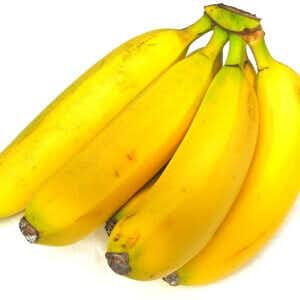
Potassium is an essential mineral. When potassium levels fall too low doctors call it HYPOkalemia. This condition can become life threatening. Symptoms include weakness, confusion, muscle cramps, muscle spasms, numbness, tingling, irregular heart rhythms, constipation, thirst and/or frequent urination. Too much potassium (HYPERkalemia) can also lead to irregular heart rhythms (palpitations), tingling or numbness in lips, feet, or hands, weakness, slow pulse and confusion. Is it possible for individuals to overdose on potassium-rich foods or supplements?
The Low-Down on Potassium:
Q. I asked my doctor if I should take potassium supplements to lower my blood pressure. Her response was “Absolutely not! Potassium is used to stop the heart.”
What’s the real story on potassium?
A. Your body works to maintain potassium within a narrow range because it is so critical to healthy functioning. Either too little or too much of this mineral could be very dangerous.
A number of drugs can alter potassium balance. Diuretics such as furosemide or hydrochlorothiazide and the antifungal drug diflucan can deplete potassium. ACE inhibitors such as enalapril or lisinopril help the body hang on to potassium. So do ARBs (angiotensin receptor blockers) like losartan or valsartan. If you took extra potassium while on an ACE inhibitor, it could lead to high levels. Anyone taking one of these should have potassium levels monitored closely.
It is far more difficult to overdose on potassium-rich foods. A Mediterranean-style diet or a DASH diet rich in vegetables provides a healthy amount of potassium. Baked potato with skin, sweet potatoes, plain yogurt, tuna, soybeans and asparagus are all great sources. Others include artichokes, apricots, avocado, bananas, beets, bell peppers, blackberries, broccoli, Brussels sprouts, cabbage, cantaloupe, carrots, cauliflower, chard, mushrooms, nectarines, oranges, spinach, squash and tomatoes.
However, if you are taking one of the medications that can lead to potassium excess, you should ask your doctor to monitor your blood periodically. That is what the next reader did.
Too Much of a Good Thing?
Q. I follow a potassium-rich diet to manage my blood pressure. However, a recent blood test showed a high level of potassium. My doctor said this could be a health hazard.
By cutting back on fruits and limiting the amounts of nuts and beets I eat, I got back to a normal level. It goes to show you that too much of a good thing can be harmful.
A. The body generally keeps potassium within a fairly narrow range. You are smart to pay attention to how your diet affects your blood level of this crucial mineral, since too much and too little potassium are both dangerous.
We hope your physician can figure out why your potassium levels got out of the safety zone. Quite a few medications can disrupt levels of potassium. Salt substitutes can also cause problems for some people:
Why Potassium Chloride Is Not Always a Safe Salt Substitute!
Can You Overdose on Potassium-Rich Foods Such as Bananas?
A few years ago we received a question from a mother concerned about her daughter’s love of bananas. She ate several every day. Here is a link to that question:
Is Daughter Risking Her Life Eating Bananas?
To put your mind at ease, most people cannot overdose on potassium-rich foods. That said, there is a case of a young woman who suffered from anorexia nervosa (Brain & Development, July, 2007). She primarily ate 20 bananas daily for roughly two years. She did indeed develop hyperkalemia.
The authors go on to note:
“When the patient resumed other food ingestion after 26 months of obsessive and restricted eating of banana, the abnormalities in her blood data and her psychological state were all corrected toward normal. We conclude that in this case, the obsessive and restricted habit of banana ingestion resulted in hyperkalemia, hyperdopaminemia, and psychological change.”
The People’s Pharmacy Perspective:
We have always been strong proponents of the saying, “moderation in all things.” That is true of foods as well as medications. You may wish to learn about drug interactions that can lead to hyperkalemia and why this is such a potentially dangerous situation.
Antibiotic plus BP Medicine Led to Deadly Drug Interaction
One reader reacted to this post:
“Thank you for continuing to write about the deadly interaction between the antibiotic SMZ-TMP and certain blood pressure pills. Because of this article you may have saved my husband’s life!
“If only doctors and pharmacists would read your articles. You wrote about such a reaction many years ago, and, at that time, I alerted my elderly friends to be aware. Little did I know that my 79-year-old husband would fall victim to such a prescription interaction last year when our elderly internist prescribed a high dose of SMZ-TMP for 14 days in treatment of pneumonia. We have known that this doctor does not keep up with updates in many areas of medicine.
Disaster Averted:
“Remembering the possibility of this deadly interaction from your articles, I immediately alerted his cardiologist who ran blood tests which determined he was suffering from dehydration and moderate loss of kidney function . He was also was taking losartan. When our internist saw the blood test results, he said, “These results must be wrong.” His cardiologist said to discontinue the drug to avoid hyperkalemia.
“I don’t know how many times I share your many articles with our cardiologist who actually reads them, which makes for a good team relationship. Keep up the good work in making us good health advocates for our own protection!”
Share your own story about potassium in the comment section below.

